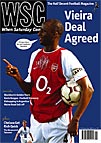 The head of the Argentine FA is in trouble after spoiling a good record of tackling anti-semitism. But other abuse goes unchecked and unremarked, writes Martin Gambarotta
The head of the Argentine FA is in trouble after spoiling a good record of tackling anti-semitism. But other abuse goes unchecked and unremarked, writes Martin Gambarotta
In Argentina, a bankrupt nation of 36 million people, everybody knows more than they say they know. Journalists, for example, have a habit of gathering news, usually in the form of gossip, which they rarely use in stories and often only divulge to mates at an asado, the traditional barbecue still common despite the economic collapse. Football journalists are especially aware that not all the news they have is fit to print.
And then there is the case of Julio Grondona, the head of the national Football Association since 1979 and a FIFA vice president. It’s not easy to interview Grondona, who rapidly loses his temper when a journalist brings up something he doesn’t like. So what happens when you manage to interview Grondona over an asado and get everything on tape? The answer is trouble – in the form of a racist slur to fend off a difficult question. Why, Grondona was asked, are there no Jewish referees in the first divi-sion? Rumour has it, the journalist interviewing him added, pretending nobody was watching, that the AFA has deliberately blacklisted Jewish refs. Here is Grondona’s reply: “It’s a difficult job,” he said, “and they don’t like difficult jobs.”
Grondona’s answer came during a recent episode of El Sello, a cable TV show which basically consists of interviewing a sports personality over an asado and some wine. Such talk did not go unnoticed in a country which has by far Latin America’s largest Jewish community. In 1994 a local Jewish community building was bombed, presumably by Islamic fundamentalists from abroad, killing 85 people.
Grondona only made life more difficult for himself when he tried to say sorry, using more of his trademark unapologetic style. What I said, Grondona told a Jewish community radio station, was not offensive – everybody just got me wrong. “All I can do is apologise,” he added.
Initially, the influential Jewish association Delegacion de Asociaciones Israelitas Argentinas (DAIA) seemed prepared to accept Grondona’s excuses over the media without taking him to court. But when the formal apology came, in the form of a letter to DAIA also laying the blame elsewhere, it just wasn’t good enough for the Jewish community.
“We have not accepted the letter, it’s absurd that a man in his position isn’t capable of realising the importance and the seriousness of his statements,” the head of DAIA said. “We’re going to sue him.” Grondona, because a special anti-discrimination law applies in this case, could face punishment ranging from a fine to two years in jail – although nobody expects to see the AFA president behind bars. The AAA, the main referees’ union, issued a statement claiming it “doesn’t share and it condemns” Grondona’s words.
Grondona has not had problems in public with the Jewish community before. DAIA had recently praised the football association for tackling the problem of racist abuse shouted by fans of teams when playing Atlanta, a third division side from Buenos Aires’ Jewish neighbourhood.
Referees, who had tolerated the insults for years, have stopped games when the abusive chanting starts during a game involving Atlanta and teams have lost points for the racism of their fans.
Grondona’s AFA is far more tolerant of similar racist abuse involving people from Bolivia and Paraguay, regularly voiced at first division games. Boca Juniors crowds, for example, like to claim they have the most supporters. But rival fans usually chant back, unpunished: “You have the most fans, but they’re all from Bolivia and Paraguay.” There’s no knowing what the mumbling Grondona makes of that.
From WSC 199 September 2003. What was happening this month